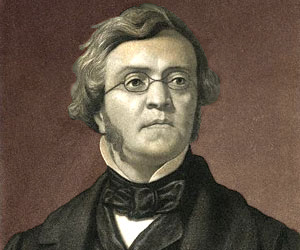
Below, William Makepeace Thackeray writes to Adelaide Anne Procter after reading her first volume of poetry, Legends and Lyrics, published in 1858. A women’s activist and devout Roman Catholic, Procter frequently addressed the themes of suffering, poverty, homelessness and fallen women in her verses. In contrast to Thackeray’s concerns about Procter’s “very very grey and sad” verses (expressed in the letter below), Charles Dickens wrote of Procter after her death: “Those readers of Miss Procter’s poems who should suppose from their tone that her mind was of a gloomy or despondent cast, would be curiously mistaken. She was exceedingly humorous, and had a great delight in humour. Cheerfulness was habitual with her, she was very ready at a sally or a reply, and in her laugh (as I remember well) there was an unusual vivacity, enjoyment, and sense of drollery.”
36 Onslow Sqre. June 4 [1858].
My dear Adelaide
Thank you for the little book with the kind little inscription on the first page. There will always be an a……….. r ….. between us, won’t there? and we shall like each other out of our books and melancholies and satires and poetries & proses. Why are your verses so very very grey and sad? I have been reading them this morning till the sky has got a crape over it—other folks’ prose I have heard has sometimes a like dismal effect.—one man’s especially I mean with whom I am pretty intimate, and who writes very glumly though I believe he is inwardly a cheerful wine-bibbing easy-going person, liking the wicked world pretty well in spite of all his grumbling. We can’t help what we write though; an unknown Something works within us and makes us write so & so—I’m putting this case de me (as usual) and de te. I don’t like to think you half so sad as your verses. I like some of them very much indeed: especially the little tender bits. All the allusions to children are full of a sweet natural compassionateness; and you sit in your poems like a grey nun with 3 or 4 little prattlers nestling round your knees, and smiling at you, and a thin hand laid upon the golden heads of one or two of them: and having smoothed them, and patted them, and told them a little story, and given them a bonbon the grey nun walks into the grey twilight, taking up her own sad thoughts, and leaving the parvulos silent & wistful. There goes the Angelus! There they are lighting up the Chapel. Go home, little children, to your breadandbutters and teas: and kneel at your bedsides in crisp little night gowns.
I wonder whether this has anything on earth to do with Adelaide Anne Procter’s poems? I wish the tunes she sang were gayer: but que voulez vous? The Lord has made a multitude of birds and fitted them with various pipes; (there goes my Anny singing in her room, with a voice that is not so good as Adelaide Sartoris’s, but wh. touches me inexpressibly when I hear it) and the chorus of all is Laus Domino.
I am writing in this queer way, I suppose, because I went to St. Pauls yesterday—Charity Children’s day, Miss, and the sight and sound immensely moved and charmed.
Yours affectionately dear Adelaide
W M Thackeray.
From Selected Letters of William Makepeace Thackeray. Edited by Edgar F. Harden. New York: New York University Press, 1996. p.328-329.
FURTHER READING
Read Charles Dickens’ introduction to Legends and Lyrics.


